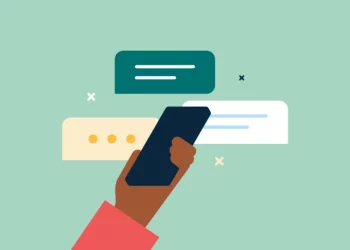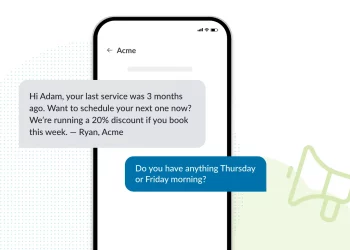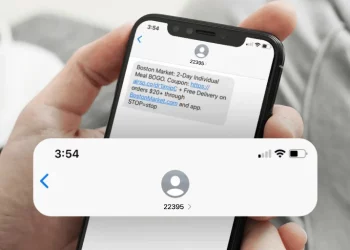In today’s digital age, the convenience of technology has extended to healthcare, with many doctors and medical institutions utilizing appointment reminder systems via text messages. However, with the rise of cyber criminals, fake appointment text messages have become prevalent, posing risks to patients’ privacy and security. This article will explore practical strategies to help patients avoid falling victim to fake appointment text messages. By following these tips, you can ensure the legitimacy of your doctor appointment texts and protect your personal information.
1. Verify the Sender:
When you receive a text message regarding your doctor’s appointment, verifying the sender’s identity is crucial. Legitimate appointment texts typically come from recognized healthcare providers or clinics. Beware of messages from unknown or suspicious senders, as they may be attempts to deceive you. If you are unsure, contact your healthcare provider directly to confirm the legitimacy of the text message.
2. Scrutinize the Message Content:
Pay close attention to the content of the appointment text message. Fake messages often contain grammatical errors, spelling mistakes, or generic phrasing that doesn’t align with the communication style of your healthcare provider. Legitimate appointment texts usually include specific details about your appointment, such as the doctor’s name, date, time, and the clinic’s address. Be skeptical of messages that lack these essential details or request personal information.
3. Avoid Clicking Suspicious Links:
Cybercriminals often employ phishing techniques to trick unsuspecting patients into revealing personal information. Be cautious of appointment text messages that contain clickable links, especially if they seem suspicious or unfamiliar. Instead of clicking the link directly, open your web browser and manually search for the healthcare provider’s official website. This ensures you access legitimate information and reduces the risk of falling prey to malicious websites or scams.
4. Be Wary of Urgent Requests:
Beware of appointment texts that convey a sense of urgency, demanding an immediate response or action. Fake messages may attempt to create panic or fear by stating that your appointment is canceled unless you provide personal details or payment information. Remember, healthcare providers typically give sufficient notice for appointment changes or cancellations through official channels. Contact your healthcare provider to confirm its legitimacy if you receive an urgent message.
5. Protect Personal Information:
Never share sensitive personal information through text messages, such as your social security number, credit card details, or medical history. Legitimate healthcare providers prioritize patient privacy and security and will not request such information via text. If you receive a text message asking for personal data, treat it as a warning sign and refrain from sharing sensitive information.
6. Report Suspicious Messages:
If you receive a suspicious appointment text message, report it immediately to your healthcare provider or local authorities. Reporting these incidents helps raise awareness and assists in preventing further scams. Additionally, sharing your experience with friends and family can help protect them from falling victim to similar fraud attempts.
7. Enable Two-Factor Authentication (2FA):
Wherever possible, enable two-factor authentication for your healthcare provider’s online services or appointment platforms. This additional layer of security adds an extra step to verify your identity when accessing your account or receiving appointment-related notifications. By enabling 2FA, you can minimize the risk of unauthorized access and reduce the likelihood of receiving fake appointment texts.
8. Educate Yourself About Common Scam Tactics:
Staying informed about common scam tactics can empower you to recognize and avoid fake appointment text messages. Keep up-to-date with the latest scams and techniques cybercriminals use by following reputable sources such as government websites, healthcare organizations, or cybersecurity blogs. By familiarizing yourself with scam tactics, you will be better equipped to identify potential red flags in appointment text messages.
9. Install Antivirus and Anti-Malware Software:
Have reputable antivirus and anti-malware software installed to safeguard your smartphone or mobile device against potential threats? These tools help detect and remove malicious software or apps that could compromise your device’s security. Regularly update these applications to benefit from the latest security patches and protect against evolving threats.
10. Trust Your Intuition:
Trust your instincts when assessing the legitimacy of appointment text messages. If something feels off or suspicious, it’s better to err on the side of caution. Take the time to verify the message’s authenticity before taking any action or sharing personal information. Remember, it’s better to confirm an appointment’s legitimacy with your healthcare provider than to fall victim to a scam.
11. Be Mindful of Public Wi-Fi Networks:
When accessing appointment-related information or communicating with healthcare providers online, be cautious when using public Wi-Fi networks. These networks can be susceptible to hackers attempting to intercept sensitive data. Use a secure and private internet connection, such as your cellular data or a trusted Wi-Fi network, to protect your information whenever possible.
12. Stay Updated on Security Practices:
Stay updated on best security practices recommended by reputable sources. Technology and security measures evolve, so it’s essential to remain informed about the latest recommendations for protecting your personal information. Regularly review your healthcare provider’s security guidelines and privacy policies to ensure you follow the most up-to-date practices.
By implementing these additional tips, you can further enhance your ability to identify and avoid fake appointment text messages. Protecting your personal information and maintaining your privacy is essential in today’s digital world. Stay proactive, informed, and cautious; you’ll be better equipped to navigate the digital landscape securely.
Conclusion:
Protect yourself from fraudulent appointment text messages by confirming the sender’s identity, examining the message thoroughly, avoiding dubious links, being wary of urgent requests, preserving your personal information, and reporting suspicious messages. Keep your health and privacy safe by staying up to date and communicating openly with your healthcare provider.














